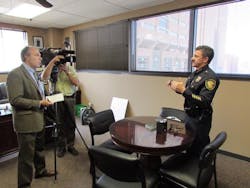Fort Worth to Buy 400 More Cameras for Officers
FORT WORTH, Texas -- The number of police officers wearing video cameras will triple with the City Council's approval on Tuesday of the purchase of 400 additional devices.
The purchase will equip 600 officers with Taser International's Axon flex cameras, making the police department the largest user of the Axon cameras in the country.
"The advantages are multiple," said Police Chief Jeff Halstead. "For first-level patrol officers that are young in their careers ... this ensures that their decisions and their activities were fair and within policy. Without it, it is literally sometimes just their word against what we're hearing from either the call, the suspect or the witnesses.
"For investigators ... you're getting real-time and real-life responses to questions directly related to a criminal investigation."
Currently, the police department has 200 cameras in use -- the majority in patrol and others in the traffic division and spread among zero tolerance, gang and SWAT units.
The cameras attach to the officer's glasses or collar.
Since Dec. 13, every graduating recruit is trained to use a camera and assigned one.
Already, Fort Worth officers have recorded more than 26,000 videos.
The videos are uploaded to Evidence.com, where detectives and supervisors can view them as evidence in criminal prosecutions, or while investigating administrative concerns or a citizen's complaint about an officer's behavior.
"There is absolutely no way to tamper with this evidence," Halstead said. "It's impossible for employees to alter it in its original state. It cannot happen."
Videos will also be randomly audited, Halstead said.
Privacy concerns
Halstead acknowledged that the Fort Worth Police Officers' Association previously raised concerns that the cameras could lead to management abuse.
"We understand there could be if you have an officer you know or think is doing wrong and do nothing but watch their videos all day, but that's not what this video is for," Halstead said.
"Striking that balance is going to take some time but we are progressively working toward that balance."
Richard Van Houten, president of the FWPOA, said his group is committed to working with police administrators in the implementation of cutting edge technology and "developing the policies and procedures necessary to govern the use of that technology."
"While on-officer camera systems can be a useful tool, it must be monitored with the knowledge that the officer, community, and victims of crimes have rights and privacy concerns that cannot be discarded in the quest for transparency," Van Houten said. "The FWPOA looks forward to our continued efforts with the department to ensure that the rights of all involved are protected."
Halstead said that although the videos have led to some additional training for officers, so far none have resulted in formal discipline.
Halstead said other police chiefs he has encouraged to test such cameras tend to draw the same conclusion.
He's heard numerous times from the other chiefs that Fort Worth's "officers police more professionally on tape. They're so much more patient and caring and giving," Halstead said.
"A lot of the officers I talk to tell me that they've always served that way but now they can prove the way they interact with citizens," Halstead said. "The true proof is in that video."
Videos categorized as criminal or administrative will be kept for a minimum of two years, under department policy. Videoes not categorized will be destroyed after 180 days.
Officers drafted policy
Department policy states that officers should activate their cameras when collecting evidence that can be used in criminal prosecutions, to record contacts with the public in which law enforcement action will potentially be taken, in foot and vehicle pursuits and in the execution of consensual searches.
The cameras should also be activated when investigating calls involving mentally distressed persons, documenting accident or crime scenes, and by at least one officer during tactical entries, such as when a SWAT team storms a house.
Halstead said the policy was drafted by a subcommittee of first responder officers -- those who would actually be using the cameras -- and only one member of management.
"I really wanted the officers to have the voice in how they wanted this policy constructed," Halstead said.
When the first cameras were purchased in August, officials said they would have been useful in the investigation of the shooting of Woodhaven homeowner Jerry Waller. Waller was armed when Officer Alex Hoeppner fatally shot Waller in his garage on the evening of May 28. Hoeppner and another officer had gone to the wrong address in response to a burglary call.
A Tarrant County grand jury declined to indict Hoeppner, who said he ordered Waller to drop the weapon before he fired.
Council approves funding
Under the contract approved by the council Tuesday, the city authorized the payment of $216,490 for the remaining fiscal year with the option to renew the agreement with Taser over the next five years for no more than $501,000 annually.
Halstead said the funding for this fiscal year comes from leftover money within the police department's budget that is earmarked for technology.
In future years, police officials hope to seek funding from the Crime Control Prevention Fund if it is renewed by voters this May. Established in 1995, the CCPD is supported by a half-cent sales tax and is aimed at funding crime reduction strategies.
"I have to find internal savings to make this happen," Halstead said. "I have given my word I'm going to grow this technology and not ask for more money because everybody is hurting right now."
Copyright 2014 - Fort Worth Star-Telegram
McClatchy-Tribune News Service
